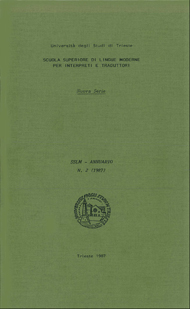Annuario n. 2 (1987) Nuova serie
Permanent URI

Download issue full text - SSLM - Nuova Serie - Annuario N° 2
Indice
Sezione I - Conferenze
Andrea Bosatra
Il controllo uditivo del linguaggio
Emanuele Calò
La disciplina giuridica della traduzione
Louis G. Kelly
Translation and the language theories of Gerhard Ebeling
Blas Matamoro
Daniel-Henri Pageaux
Hispanoamerica y literatura comparada
Rosa Rossi
Alcuni problemi della traduzione dei mistici spagnoli
Anna Paola Sartirana
Carmen Sylva: un esempio di scrittura femminile
Mariano Solivellas Aznar
El lenguaje deportivo y problemas de traducción
Sezione II - Contributi
Nadine Celotti
Lucienne Furois
Mise au point sur la personnalite de Fatouville
Lucienne Furois
Paul Morand, un triestin d'adoption
Robert Jewett
Feminine values in 'Heart of Darkness'
Lorenza Rega
Franz Tumler: L'impossibile verità della storia
Sergio Sacchi
In cauda venenum : cazotte e l'ultima frase del 'Diablo Amoureux'
Christopher Taylor
Translating punctuation (English-Italian/Italian-English)
Details
Nuova Serie
SSLM - Annuario N° 2 (1987)
Comitato Redazionale:
Gerald Parks
Franco Crevatin
Lorenza Rega
